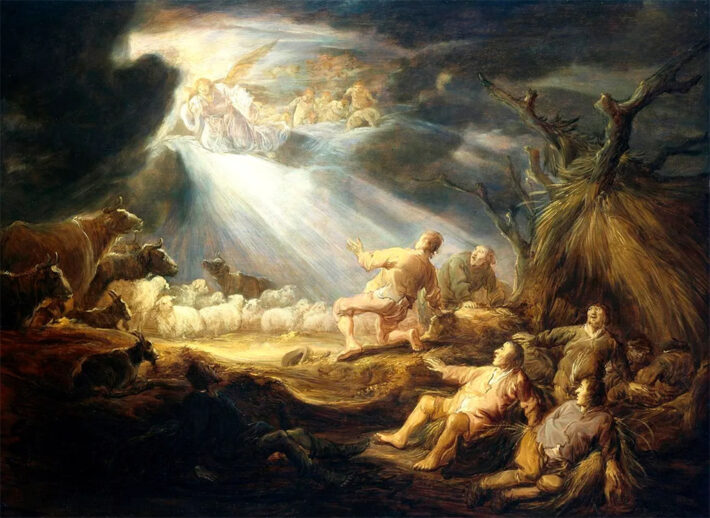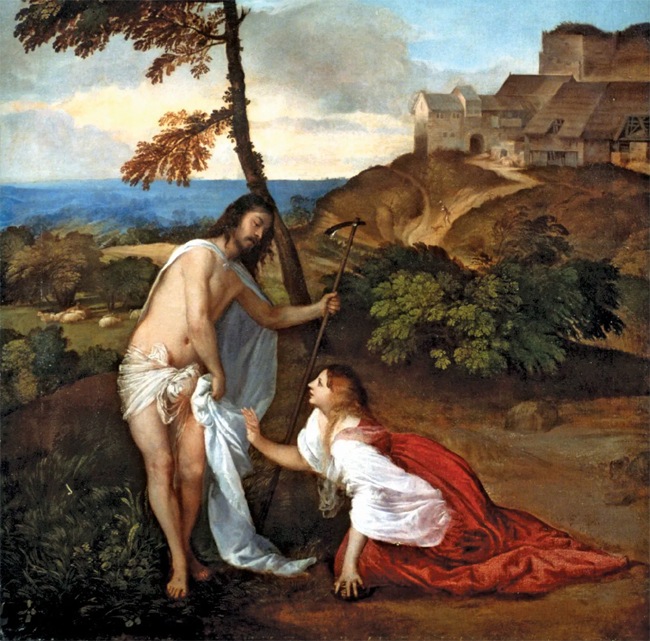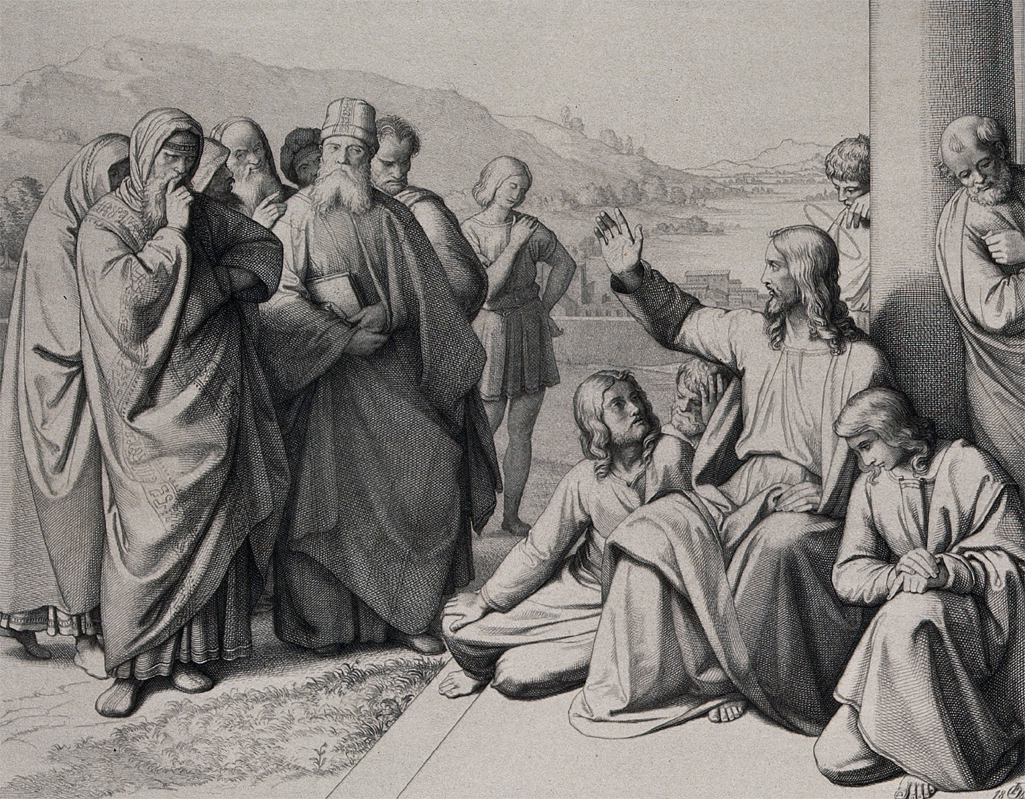Luke 2: 1-14; 15-20 – Midnight of Christmas Eve; Dawn of Christmas Day
1 AND it came to pass in those days, that there went out a decree from Cæsar Augustus, that all the world should be taxed.
2 (And this taxing was first made when Cyrenius was governor of Syria.)
3 And all went to be taxed, every one into his own city.
4 And Joseph also went up from Galilee, out of the city of Nazareth, into Judæa, unto the city of David, which is called Bethlehem; (because he was of the house and lineage of David:)
5 To be taxed with Mary his espoused wife, being great with child.
6 And so it was, that, while they were there, the days were accomplished that she should be delivered.
7 And she brought forth her firstborn son, and wrapped him in swaddling clothes, and laid him in a manger; because there was no room for them in the inn.
8 And there were in the same country shepherds abiding in the field, keeping watch over their flock by night.
9 And, lo, the angel of the Lord came upon them, and the glory of the Lord shone round about them: and they were sore afraid.
10 And the angel said unto them, Fear not: for, behold, I bring you good tidings of great joy, which shall be to all people.
11 For unto you is born this day in the city of David a Saviour, which is Christ the Lord.
12 And this shall be a sign unto you; Ye shall find the babe wrapped in swaddling clothes, lying in a manger.
13 And suddenly there was with the angel a multitude of the heavenly host praising God, and saying,
14 Glory to God in the highest, and on earth peace, good will toward men.
15 And it came to pass, as the angels were gone away from them into heaven, the shepherds said one to another, Let us now go even unto Bethlehem, and see this thing which is come to pass, which the Lord hath made known unto us.
16 And they came with haste, and found Mary, and Joseph, and the babe lying in a manger.
17 And when they had seen it, they made known abroad the saying which was told them concerning this child.
18 And all they that heard it wondered at those things which were told them by the shepherds.
19 But Mary kept all these things, and pondered them in her heart.
20 And the shepherds returned, glorifying and praising God for all the things that they had heard and seen, as it was told unto them.
Jesus is born into what must have been, for Mary and Joseph, the most trying, indeed tedious, of circumstances. Who of us likes filling in a tax return? And we don’t usually have to travel to a different city to do so, let alone know that our taxes are dictated by a foreign and conquering power.
The Jewish people, the children of Abraham, Isaac and Jacob, are subjected. Where is freedom? Where is the promised land? Where is the Messiah who will free them and lead them to the Kingdom of God?
Well, he’s here. He’s about to be here. And he is to bring the Kingdom of God, salvation, not only to the Jews but to all the nations of mankind. This seemingly inauspicious beginning, hardly what one might expect of a King, carries a truth that will remain true of Christ’s whole ministry.
There is no room for Christ in the inn. Mary, through the infinite love of a mother for her child, does what she can; she wraps him in swaddling clothes and gently lays him in the manger which must serve as his crib. We can only imagine the love and care made manifest through, and even more exulted by, such testing circumstances. We may wonder how Mary kept her faith and what must have been going through her mind, seeing herself and her child like this after all the angel Gabriel had promised her: this must have been a great test of love and faith.
Already we know there are lessons here. We ask ourselves as we celebrate Christ’s nativity: Is there room for Christ in my life? Have I shut the door and said ‘Busy! Full! No Vacancies!’ or have I welcomed Christ to be born within me? Have I listened to the Word? We might think of the luxuries of our lives which distract us from full union with Christ, whereas if we adopt a spirit of poverty and humility we might the better perceive Christ’s love and Christ’s calling. We think of Mary and of her absolute love, and through her example we may be the better equipped to welcome Christ. We may even learn to welcome our suffering – as a path to Jesus, a gateway in our lives akin to the cross.
The lesson of poverty, humility and openness to God continues. A royal birth is often a cause for great spectacle and celebration. Well, so is Christ’s, though not in a way those looking for the birth of the Messiah might have anticipated. To whom is Christ’s birth first announced? To shepherds. These are normal, humble people. They live their lives far, far away from the more conventionally devout trappings of the civic and religious hierarchical leaders. But by whom is this good news announced and in what manner? This truly is spectacular!
The details of the shepherd’s lives are significant. They are minding their flock. We think of Christ’s parables. They watch: they are awake, alert. We think of those verses toward the end of Christ’s Sermon in the Temple. We do not know when Christ will come. ‘Watch!’ we hear Christ say to us. ‘Stay alert!’ Our spiritual preparations through Advent have perhaps sharpened our sense of watchfulness. The way the shepherds are living their lives this evening fits them, according to Christ’s words, to be the first to receive the good news of his coming.
The shepherd’s fear at the appearance of the first angel once more reminds us of Mary, who was herself at first afraid. They are similarly reassured: ‘Fear not.’ And the shepherds accept this. They are truly ready for salvation. We are reminded that Christ has been born in the city of David: the prophecies are fulfilled; God’s great scheme for our salvation, prepared for through all ages, through the whole of the Old Testament, has reached this point of its culmination. And to magnify the absolute significance of this message to all mankind, there is now a whole multitude of the heavenly host gathered this night with the shepherds to praise God: ‘Glory to God in the highest, and on earth, good will toward men.’ We might almost hear relief on the part of all heaven that God’s great love to man is to be fulfilled. At last! After all these years and these wanderings. Man is ready once again, at last, to receive God’s love.
The shepherds hasten to Mary and Joseph and Jesus. This is their heightened response to the word of God. There is no dilly-dallying, no looking behind, no prevarication: they go immediately to witness what the angels have told them.
Mary through this time is herself a watchful figure, really still not knowing quite what all this might mean. ‘Mary kept all these things, and pondered them in her heart.’ While the shepherds immediately go abroad and spread the good news, and what a perfect response to the Gospel this is, what a perfect example to us all when we hear the word of God, Mary is watchful over her child; there is a great deal for the mother of God to think about. It is going to be a very difficult journey for Mary. It is as if she begins to realise the enormity of what she has freely accepted God has done through her.
‘When the designated time had come, which God in his deep and impenetrable plan had fixed upon, God’s Son took the nature of man upon himself in order to reconcile man to his Creator. Thus would the devil, the father of death, be himself overcome by that self-same human nature which he had overcome.
‘The angles therefore exult at the birth of the Lord: they sing “Glory to God in high heaven”; they announce “Peace on earth for men on whom favour rests”. For they behold the heavenly Jerusalem being constructed from out of all the peoples on earth. How greatly ought mere men rejoice at this mysterious undertaking of divine love, when the angels on high thrill so much at it.’ St Leo the Great








